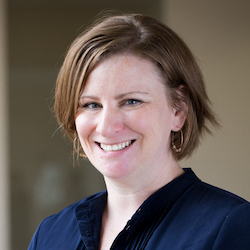In 2012, Edward Hubbard, a cognitive neuroscientist and assistant professor with UW–Madison’s Department of Educational Psychology, created the Educational Neuroscience Lab to understand — through functional magnetic resonance imaging (fMRI) — how the physical changes that occur in children’s brains as they learn may help improve education practices.
 “We use the same type of MRI scanner you’d find at a hospital, but it’s tuned a little differently,” explains Hubbard, also a principal investigator at the Wisconsin Center for Education Research, who directs a 40-member team at the EdNeuroLab, where work revolves around numerical cognition, synesthesia, and autism spectrum disorders. “This special scanner picks up blood flow signals in the brain — and by knowing where the blood is going, we can tell which parts of the brain are active when kids do different things, like reading words or computing math problems.”
“We use the same type of MRI scanner you’d find at a hospital, but it’s tuned a little differently,” explains Hubbard, also a principal investigator at the Wisconsin Center for Education Research, who directs a 40-member team at the EdNeuroLab, where work revolves around numerical cognition, synesthesia, and autism spectrum disorders. “This special scanner picks up blood flow signals in the brain — and by knowing where the blood is going, we can tell which parts of the brain are active when kids do different things, like reading words or computing math problems.”
Fractions, in particular, have been a special interest. “We know that fractions are hard and it’s a hurdle that many children struggle to get over,” says Hubbard. “However, research shows that fifth graders who understand fractions go on to do better in algebra, which is the gateway to higher math skills critical to success in the STEM workforce.”

From the early days of the EdNeuroLab, Hubbard has been collaborating with Percival Matthews, an associate professor with the School of Education’s Department of Educational Psychology and director of the MELD (Mathematics Education Learning & Development) Lab.
With a mutual professional interest in improving fraction learning, the researchers joined forces on a five-year study called LAMBDA (Longitudinal Analysis of Mathematical Brain Development and Abilities), funded by a $1.9 million grant from the National Institutes of Health.
LAMBDA has been exploring a number of questions about fractions, such as: Why are they so hard to learn? What brain systems support fraction learning? And how do these systems develop in schoolchildren?
Learn much more about this work via this WCER report.
— By Lynn Armitage, Wisconsin Center for Education Research communications
‘Beats Empire’ moves hip-hop from fiction to online learning tool
Fans of the hip-hop television drama “Empire,” which abruptly ended its six-year run in April, and anyone interested in the music industry, can take a step closer to the realities of the music business by immersing themselves in a new and free online learning game, “Beats Empire.”
With its name inspired by the award-winning show, Jay-Z songs, and a New York City vibe, university researchers from Columbia, UW–Madison, and Georgia Tech worked together to create the game, which places players in the roles of music producers who leverage data and analyze trends to dominate the music industry.
 “Beats Empire,” released to the public in April, is designed for use in middle school classrooms and at home. Built upon education research, the game is recommended for players from middle school through adults. It was developed with National Science Foundation funding as a collaboration among research universities and private sector partners, along with the New York City Department of Education.
“Beats Empire,” released to the public in April, is designed for use in middle school classrooms and at home. Built upon education research, the game is recommended for players from middle school through adults. It was developed with National Science Foundation funding as a collaboration among research universities and private sector partners, along with the New York City Department of Education.
“’Beats Empire’ was designed to invite learners to playfully explore how data can be used to do interesting things in the real world, as well as to be used as an assessment tool by teachers to formatively assess how students understand and make use of data,” says Nathan Holbert, principal investigator and assistant professor of communication, media, and learning technologies design at Teachers College, Columbia University.
The key goals of “Beats Empire,” which already has received an award from the Serious Play Conference and a favorable review from Common Sense Media, are for students to explore how their data skills address a real world challenge and to learn about attractive data science jobs. The goal for teachers is to increase their knowledge of what students know and can do.
Players take on the role of a music studio manager who selects which artists, songs, and markets to pursue. “Players use their prior experiences and interest in music to make sense of in-game representations,” says Matthew Berland, a co-principal investigator, UW–Madison School of Education associate professor with the Department of Curriculum and Instruction, and Wisconsin Center for Education Research researcher.
Musical characters created for the game, such as Beyonde and Half A Dollar, are fictional but named to resemble real artists. The game content meets four educational standards: Computer Science Framework, CCSS for Math, Next Generation Standards, and National Curriculum Standards for Social Studies.
Players must use data and computational thinking to promote their artists’ careers. When classes play this game, learners share what they know and can do with data. The game also allows teachers to assess their students’ knowledge and support them in learning about data collection, storage, visualization, and inferences.
In addition, the game also enriches lessons on critical thinking, trend analysis, and decision-making. Because lessons are built into gameplay, all players gain some new skills.
Through focus groups and hands-on testing, New York City middle school students guided the design of the game. The testing found that learners become highly engaged as they use data to advance the careers for their musical artists.
In addition to Teachers College, Columbia University; Georgia Tech; and the University of Wisconsin–Madison, private sector organizations SRI International; Digital Promise; and Filament Games worked on the project in concert with the NYC Department of Education, and with funding from the National Science Foundation. “Beats Empire” is totally free and has already won game design awards.
Check it out at: https://info.beatsempire.org
— By Janet L. Kelly, Wisconsin Center for Education Research communications
WIDA receives $4 million grant to support multilingual learners with cognitive disabilities
Educational tools and resources for assessing a small but important group of students, multilingual learners challenged with the most significant cognitive disabilities, now will become reality thanks to a U.S. Department of Education grant worth nearly $4 million.
The Advancing Alternate English Language Learning Assessment (ALTELLA): Alternate Assessment Redesign project is a four-year collaboration among: WIDA, a leading support organization for multilingual learners, educators, and families; WIDA partners; and the Minnesota Department of Education (lead state), Texas Education Agency, national experts, and key external groups. The grant is for $3.998 million.
 “This is an exciting opportunity to continue our work on behalf of this often-overlooked population of students,” says Laurene Christensen, project director of the new initiative, which is part of the Wisconsin Center for Education Research in UW–Madison’s School of Education. Along with Christensen, H. Gary Cook, principal investigator of the project, points out that recent research shows that almost one-quarter of multilingual students with significant cognitive disabilities do not receive English-language services — even though United States public schools are required to offer these services to all students learning English.
“This is an exciting opportunity to continue our work on behalf of this often-overlooked population of students,” says Laurene Christensen, project director of the new initiative, which is part of the Wisconsin Center for Education Research in UW–Madison’s School of Education. Along with Christensen, H. Gary Cook, principal investigator of the project, points out that recent research shows that almost one-quarter of multilingual students with significant cognitive disabilities do not receive English-language services — even though United States public schools are required to offer these services to all students learning English.
“For the past two years, investigators have been building a research repository — made possible by an initial grant from the U.S. Department of Education — to better understand and advocate for multilingual learners with cognitive disabilities and now, we will be able to apply that work,” adds Christensen.
Advancing ALTELLA will focus on updating Alternate ACCESS for ELLs (WIDA’s large-print, paper-based test administered to multilingual students with significant cognitive disabilities in grades 1-12), developing a kindergarten version of Alternate ACCESS for ELLs, and building a screening tool that will be used to identify English language learners.
“We know that learning English is an important step in the pathway to success for a multilingual learner,” states Christensen. “With Advancing ALTELLA, we’ll be able to ensure that all students and teachers have more tools to support English development for these learners.”
Advancing ALTELLA builds on the initial ALTELLA project. During that project, Christensen and her colleagues collected survey data on more than 1,500 students, traveled across the country to conduct classroom observations and interviews, and gathered input on future assessment design.
“Knowing that so many multilingual students with cognitive disabilities are not getting the services they need signals to all of us here at WIDA that Advancing ALTELLA is imperative,” says Christensen. “So much of what WIDA does is provide resources to multilingual learners, and no learner or classroom should be left out.”
WIDA, part of the University of Wisconsin–Madison, works to advance academic language development and academic achievement for children and youth who are culturally and linguistically diverse through high-quality standards, assessments, research, and professional learning for educators. WIDA’s resources are used by 41 domestic states and territories, and more than 400 international schools throughout the world.
— By Katie Stenz, WIDA
Ruppar receives $1.4M grant to train special education and communication sciences and disorders students together
Andrea Ruppar is the principal investigator (PI) on a new $1.4 million grant that will train students at the university how to work with young people who have complex communication needs over the next four years.
Ruppar is an associate professor of special education with the School of Education’s Department of Rehabilitation Psychology and Special Education (RPSE). Kimber Wilkerson, a professor with RPSE and the faculty director of the School’s Teacher Education Center, is a co-PI on this project along with Katie Hustad, a UW–Madison professor of communication sciences and disorders.

The grant, which is funded by the U.S. Department of Education’s Office of Special Education Programs, will allow the team to collaborate with local schools to provide practical experiences for 16 UW–Madison students studying communication sciences and disorders, and 16 students studying to become special education teachers.
The UW–Madison students will learn about assessment, literacy, and communication instruction for young people who use augmentative and alternative communication in inclusive school settings. The UW–Madison students will gain hands-on experience in the UW Speech and Hearing Clinic, will have shared coursework and school-based practical experiences, and learn state-of-the-art interventions for communication instruction.
Ruppar explains how students who have complex communication needs have disabilities that make verbal speech difficult. Examples include autism, apraxia of speech, cerebral palsy, intellectual disability, or multiple disabilities.
“Students with complex communication needs are more likely to be excluded from everyday school activities,” says Ruppar. “I am passionate about opening the doors of communication to students who do not speak to communicate, and I am thrilled to be able to collaborate with colleagues in communications sciences and disorders to pass that passion on to future educators. Through this partnership, we will be able to provide specific and intensive training to create a cohort of experts ready to transform education for learners who have always been on the margins of education.”
Miller launches podcast, ‘Sport and the Growing Good’
Peter Miller has launched a new podcast called, “Sport and the Growing Good.”
Miller is a professor with the School of Education’s Department of Educational Leadership and Policy Analysis and he chairs the university’s Athletic Board. Miller is an expert on community-based educational leadership, education in contexts of homelessness, and school-community collaboration. He also teaches and writes about leadership and reform in youth and intercollegiate athletes.

His podcast examines how athletics contribute to everyday improvement in our society by taking an embedded approach to tell stories of the “hidden” people and practices on the front-lines of sport.
Since launching the podcast in January 2020, Miller has spoken with high school and college coaches, student athletes, and experts on the topic from Wisconsin and across the nation.
On episode 22 of “Sport and the Growing Good,” Miller featured Paul Chryst, the head football coach at UW–Madison. One of the many topics the two discuss is high school football programs and how to identify a good one. For Chryst, it’s about identifying a coach who is organized and passionate: “When you go in you know there’s three, four things that they’re just proud of. They can’t wait to show. And then you kind of sense it, feel it.”
Check out the podcast and its 50 episodes here.